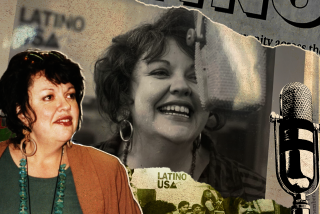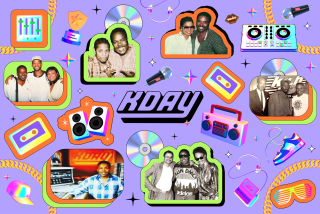Just friends, sitting around talking
- Share via
WASHINGTON — Audiences for traditional news media are becoming ever smaller. Many Americans are experimenting with technologies that let anybody play publisher or reporter. Now, as the big media search for ways to shore up public confidence, one of public radio’s most creative storytellers is reaching into history to take the medium back to the future.
Dave Isay -- a New York-based producer who has captivated public radio listeners with intimate stories he has collected by, for example, giving tape recorders to kids who live in the roughest of Chicago housing projects -- is presiding over a drive to collect 250,000 oral histories of everyday Americans.
Inspired by the personal narratives recorded by the Depression-era Works Progress Administration, Isay’s StoryCorps recently parked its two Airstream trailers in front of the Library of Congress for 10 days. Inside, StoryCorps staffers assisted people both prominent and not as they crafted 40-minute conversations with a relative or friend about the big questions in their lives.
Recordings of the resulting stories will be placed in an archive at the library’s American Folklife Center. Excerpts from at least one story a week are being played each Friday on National Public Radio’s “Morning Edition.”
“The idea is so simple,” Isay says. “We’re inundated with so much phoniness all day: celebrity stories, TV, radio, newspapers. In this culture where we spend so much time shouting, screaming at each other, we’re providing this quiet space where you can just talk. You bring anybody you want, somebody you love, to the booth, and we create a kind of magical space where people can connect.”
Facilitators help people shape their interviews, then get out of the way and just listen as people who know each other best probe in intimate spaces. So you hear parents tell their children how they first fell in love, and children asking parents how their marriages went wrong, and old folks telling secrets they’ve withheld for decades.
Most of Isay’s work focuses on people who don’t ordinarily make the news, giving voice to people who work on death row, people whose faiths lead them to behave far outside accepted norms, barbers and embalmers, obsessives and rejects, a castle builder and a carnival barker.
Chuck Brown, Washington’s godfather of go-go music, came to the StoryCorps booth the other day with his younger brother, the Rev. Robert Brown, and the two talked about growing up in rural Virginia, about “very personal things, tough times” -- Chuck Brown’s voice dropped to a whisper -- “and jail, and playing guitar, trials and tribulations.”
“Count it all joy,” Robert Brown said. And the brothers, old enough to be retired but still making music and preaching the gospel, nudged each other like little boys.
Their story, like the thousands the StoryCorps will collect as the Airstreams travel from coast to coast, “is a kind of spontaneous revelation of the American tapestry,” NPR President Kevin Klose says. “Radio is a companion to people. People welcome us into their lives in a unique way.”
Some of that connection has been lost over a generation of corporate blandness on the radio. “Everyday Americans basically get in the media when their house burns down, and that’s not right,” says Steve Inskeep, the “Morning Edition” host. “We struggle with that.”
The stories Isay collects are not news in the traditional sense, but they are classic tales of triumph and despair, survival and love.
Blogs, podcasts, independent film -- the new media offer people who feel ignored or misread by the big media a chance to take control.
On public radio, StoryCorps is one way the big boys hope to reconnect.
More to Read
The biggest entertainment stories
Get our big stories about Hollywood, film, television, music, arts, culture and more right in your inbox as soon as they publish.
You may occasionally receive promotional content from the Los Angeles Times.










